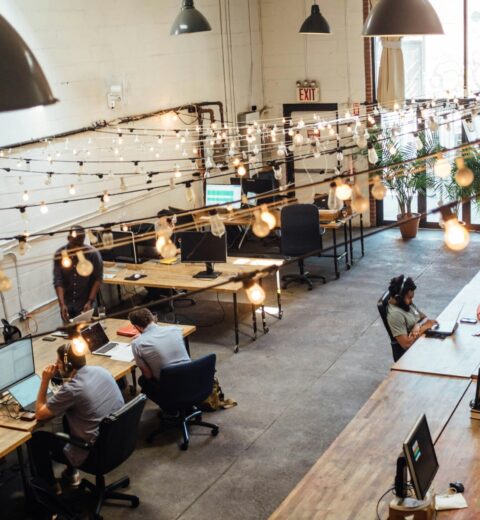Have you ever felt, after spending an entire week working from home, as if it just slipped away, as if that week never happened? When you primarily work on a computer and entirely from home, it's easy to experience this feeling: days, weeks, months fly by like a bug startled off a windowpane. Despite the week being busy and professionally stimulating, it still feels enveloped in a kind of stagnant, used air.
There are times when one feels pleasantly tired after a job well done. This, however, is not that feeling. The explanation is simple: in a stimulus-poor environment, the energy balance is disturbed. With the absence of human connections, there's a decrease in incoming energy, and there's not enough to counterbalance the energy-consuming activities (e.g., tasks you dislike, annoying colleagues, stress).
Just how many people might this issue affect? Remote work is now much more common and frequent than you might think. Before the pandemic, about 5% of employees worked from home in the EU, and this number has since increased.For freelancers and solo entrepreneurs, working from home is clearly the norm. freelancerek) számára pedig egyértelmű a home office.
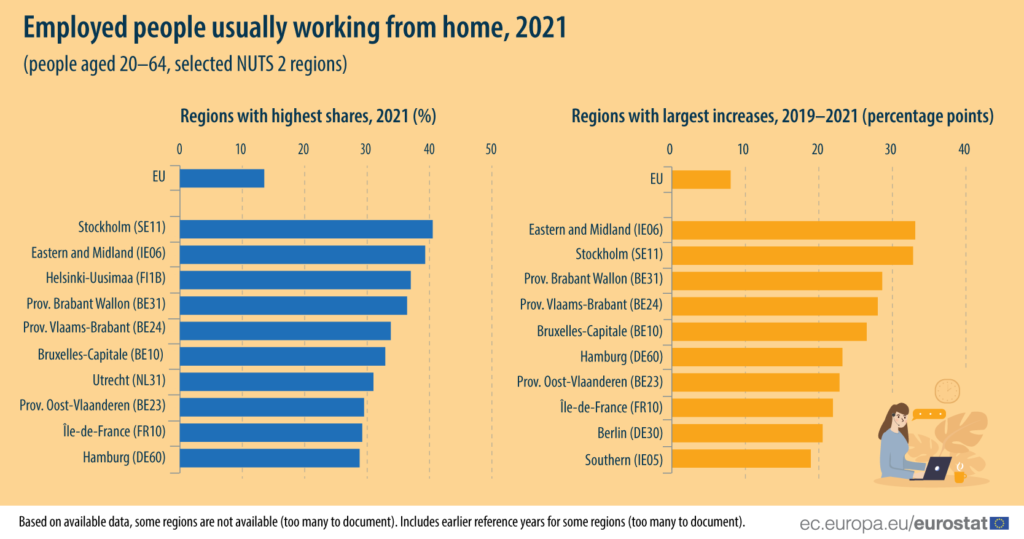
Unfortunately, reliable statistics are not yet available on exactly how many people in Hungary work 100% from home (including entrepreneurs) in the post-pandemic years. However, if you conduct a quick survey among your acquaintances aged 25 to 55 who are engaged in intellectual work and are actively working, I believe that out of every ten people, at least one definitely works from home to some extent, and it's possible that some spend every day at home. You might even find someone among them who has gone full circle with remote work and switched jobs precisely because they didn't want to be at home all day!
For those who have been working from home for several years, there's no need to explain the feeling of emptiness that sets in after about 3-5 years of remote work. By then, the honeymoon period is over, the novelty wears off, and if we don't take action, working from home can negatively impact our quality of life: creativity declines, motivation dwindles, and momentum fades. Don't get me wrong, working from home is a good thing, but like everything, it's best consumed in moderation.
Apologies for the long introduction, but perhaps it's the best way to understand what coworking or community offices are and what justifies their existence. Because the solution to the loneliness of working from home isn't necessarily to work for a company with an office (and it's also not a feasible solution for many to work less and wander around during work hours).. This is where coworking comes in, which we'll explore in more detail: what coworking is, how it works, and the benefits of working in a community office!
What is coworking, or a community office?
Coworking, or a community office, clearly saw a surge in popularity with the advent of COVID-19, which catapulted the genre of working from home into prominence, though even before the pandemic, there were many who did not go into an office every day. A testament to this is that the first community office in the capital city, a Loffice Budapest Loffice Budapest, is celebrating its 15th anniversary this year! The world's first coworking office, C-Base, actually opened in Berlin in 1995. If you're interested in delving deeper, you can read more about the universal history of community offices here.
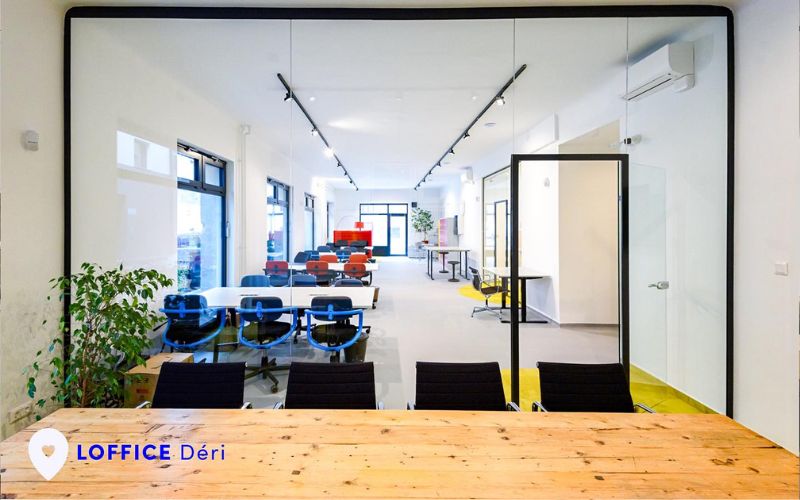
So, what exactly is this? Coworking offices are workspaces designed for work that anyone can use as their own office for a certain fee. Although the people working here are in the same physical space, they are not colleagues and work independently from each other.
Who benefits from this? Freelancers working from home, entrepreneurs, remote employees, and location-independent digital nomadswho are constantly on the move and need a place where they can efficiently and peacefully get their work done.
Whichever one you might be, coworking offices warmly welcome those who seek an inspiring work environment. All you need to do is bring your laptop, pick a desk that you like, and you can start working as soon as you connect to the blazing-fast WiFi (which, by the way, is a basic requirement in every coworking office).
In coworking spaces, there is almost always a coffee machine or a café corner, and many places also boast a fully equipped kitchen. The kitchen or café corner is the soul of the community offices, offering you the chance to converse with others and build connections.At most locations, you can also participate in community events: for example, networking events, business breakfasts, community lunches, or professional meetups and workshops.

Coworking offices are chosen by those who do not have their own office, do not want to work alone at home, or find their home environment unsuitable for efficient work (e.g., noisy surroundings, loud children). Essentially, coworking offices are alternatives to cafes but with fewer distractions and no requirement for regular food/drink orders (relatively few cafes appreciate someone sitting for hours with minimal ordering).
In exchange for a daily fee (which varies by office but is roughly around 5000 HUF), coworking spaces provide an uninterrupted and high-quality office environment for the entire day. At most places, the daily fee also includes unlimited consumption of coffee and tea.
Globally, there are approximately 20,000 coworking spaces,and in Hungary, there are about 30-40. They are primarily located in Budapest, but interesting and inspiring coworking spaces can also be found in rural areas. Naturally, the best ones can be found on the On the Coworking Hungary website website!
How do community offices work?
Many people confuse community offices with community spaces that are available for free or at a very discounted rate. While the latter is typically operated by a municipality, non-profit organization, or foundation as a venue for community events, a community office or coworking space is usually run by a profit-oriented organization, and its primary function is to provide a high-quality office environment.
Pay attention, the office serves its function, but the essence, the very soul of coworking, is actually the COMMUNITY. The first time you walk into a coworking space is likely because you're curious, you liked the photos, the furniture. But the reason you'll stay, possibly for years, is because of the community—kind, friendly, lively people surrounding you. Research proves that a live, human smile, especially laughter, is a kind of minor miracle. Whether you're giving or receiving it, it unleashes a tremendous amount of positive energy. No technological achievement can substitute for this, not even artificial intelligence. A virtual person will never be quite real (I can't believe I just wrote that).
But let's see exactly how these offices operate:
In exchange for a specified daily fee (or monthly fee in the case of a subscription), you can use the coworking spaces as your own office. Mostly, you receive a desk, also known as a workstation, for your money, which you can choose from among the available desks. In addition, you can avail yourself of the coworking space's other services. For example, more and more offices are setting up silent booths (Silent box), i.e., phone booths where you can retreat for online meetings so as not to disturb others and so they don't disturb you during a private conversation.
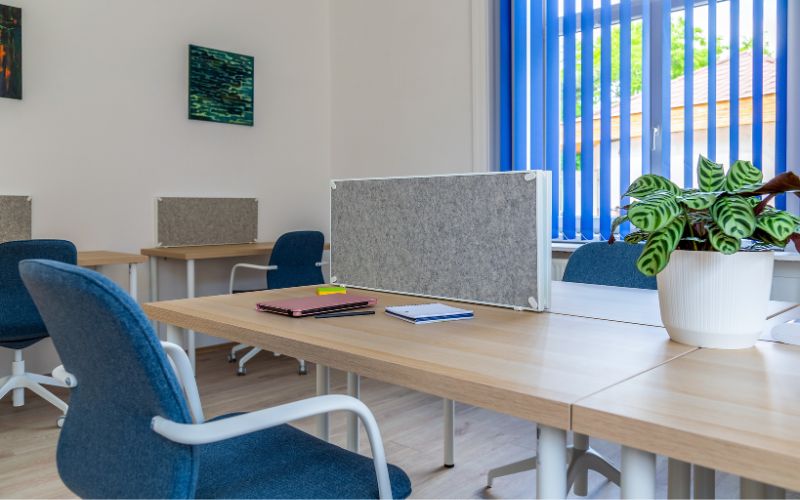
Community offices are mostly located in easily accessible, central locations, with tastefully decorated spaces, meeting rooms, and a shared kitchen. Every office is different, each with its own unique atmosphere, decor, and community. Some places place great emphasis on ergonomics and comfort. In others, the kitchen equipment is above average. There are coworking spaces with podcast rooms, and many places also offer event spaces for rent, or even virtual office services.
Why is it worthwhile to work in a community office?
While this is a highly subjective opinion, it becomes nuanced by the fact that as the founder of Coworking Hungary and someone who knows numerous community offices and the people who work there, my view remains unchanged: working in a community office is unequivocally worthwhile because of the COMMUNITY. I have made many dear acquaintances and friends in these places, built professional relationships, learned from other entrepreneurs, and gained clients. Each person has added a flavorful, spicy crumb to my life, which personally makes me feel better and find more meaning in my daily life. But to summarize:
- Inspiring, Professional Work Environment: Community offices are almost invariably designed with good taste, or at least with good intentions, by people. Of course, everyone has different tastes, but coworking spaces generally offer a pleasant office environment with comfortable desks, chairs, printers, and tea kitchens. The furnishing, cleaning, basic office services, and building management (reception, printing, heating, cleaning, etc.) are handled by local staff, so you won't have to worry about that. You just enter the professional office to work, and when you're done, you go home to relax. Work and home remain distinct.If someone visits you, there's no need to tidy up beforehand; you can host guests at the community office anytime.
- Social Connections:Working in community offices creates opportunities to connect with others. Don't imagine that from the first minute, there's non-stop chatter. But if you've worked in an office several times, you'll surely exchange a few words with someone. If with no one else, then with the Community Manager (yes, such a role exists, tasked with managing the community) or the owner, who likely started a community office to talk to people and thereby improve their quality of life.
- Professional Networking and Development: Co-working (literally working together) creates opportunities for knowledge and experience exchange. Community offices often organize workshops, trainings, and events that can aid in professional development. For freelancers, coworking is a true goldminewhere they can find business partners and new clients. It's also common to be deeply focused on solving a problem, then take a break for coffee and bump into someone. You share your issue with them, and they give you a good tip on how to solve it. This has happened to me. Not just once, but several times.
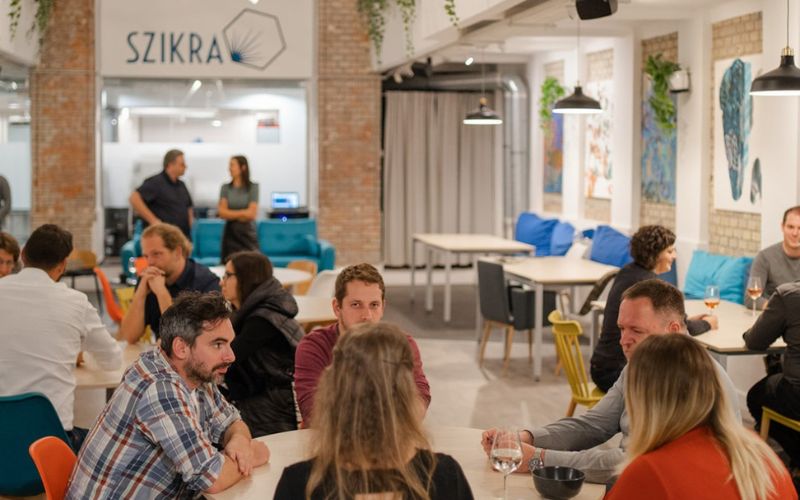
In a word, these offices are not just workplaces but vibrant communities where the creative spirit and collaboration are revitalized in the 21st century. Whether you're a freelancer, entrepreneur, or employee working from home, community offices offer structure, inspiration, and opportunities for collaboration, thereby helping to establish a healthy balance between work and personal life.
Open a window to fresh air and try coworking yourself! On the Coworking Hungary website , you can choose from numerous offices in Budapest and beyond.


